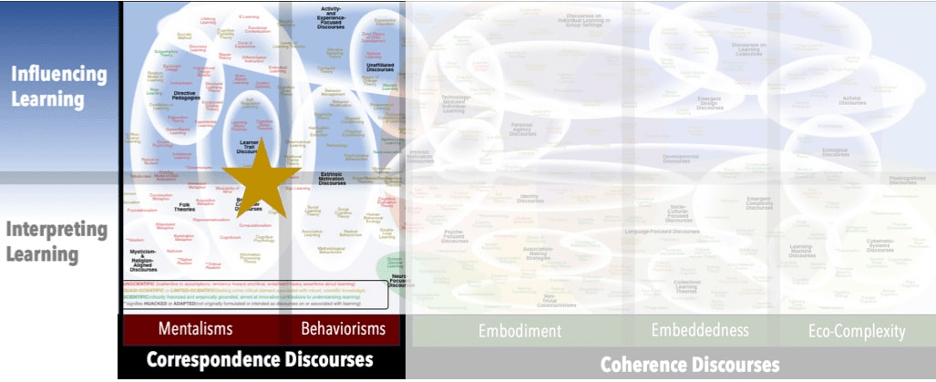AKA
Positive Science
Positive Philosophy
Focus
Experience-based standards of scientific truthsPrincipal Metaphors
- Knowledge is … all demonstrable truths
- Knowing is … experience-based awareness
- Learner is … an experiencer, inquirer
- Learning is … deriving truth from experience
- Teaching is … formatting experiences
Originated
early 1800sSynopsis
The root meaning of “positive” in Positivism has to do with certainty, as evoked in the statement, “I’m positive that’s true.” Positivism originally asserted that the highest standard of certainty is scientific fact – which, it is further asserted, can only be derived through direct experiences of phenomena. Such experiences typically include observation of and experimentation on the phenomenon of interest, coupled with reasoned argument that is attentive to what is known about surrounding and related phenomena. Constructs at the core of original conceptions of Positivism include:- Verification Principle (Principle of Verifiability; Verifiability Criterion of Meaning; Verificationism) (Ludwig Wittgenstein, 1920s) – the assertion that a statement is deemed “meaningful” only if it can be verified.
- Falsifiability (Falsification; Refutability) (Karl Popper, 1930s) – a proposed strategy for distinguishing “science” from “non-science”: to be considered scientific, a claim must be subject to Falsifiability. That is, there must be potential to prove it wrong or incomplete using empirical methods. If there is no potential to prove a claim to be lacking, it is not properly scientific.
- Logical Empiricism (Logical Positivism; Neopositivism) (Vienna Circle, early 1900s) – an attempt to mesh principles of mathematical logic with the conviction that sensory experience is the basis of knowledge, based on two main principles: (1) statements made in everyday language can be parsed into discrete units of meaning; (2) only statements that can be verified through direct experience or logical proof can be deemed truly meaningful. Phrased quite differently, Logical Empiricism combines the exacting methods of mathematics with the study of philosophy.
- Machian Positivism (Ernst Mach, 1870s) – a version of Positivism that incorporates the realization that human perception can never be rid of individual subjectivity or species-specific penchants, and so there can be no fully objective knowledge
- Postpositivism (Postempiricism) (D.C. Phillips, 1990s) – a problematizing of Positivism’s assumption that the researcher is separate from the researched, Postpositivism asserts that the researcher’s history (i.e., biases instilled by culture, education, assumptions, values, etc.) can influence observations.
- Unified Positivism (Arthur Staats, 1970s) – an attempt within Psychology to unite the domain by embracing a strict empiricist approach, modeled on physics
As might be anticipated, there are theoretical perspectives that define themselves in contradistinction ot Positivism, including:
- Antipositivism (Antinaturalism; Interpretivism; Negativism) – a perspective that asserts that Positivism and its associated methods of investigation are not suited for studying social and cultural phenomena. Rather, such phenomena require more tentative research attitudes that account for ongoing transformation, that are attentive to context, that are sensitive to the shaping influences of culture and language, and the embrace the particularities of personal experience.
Commentary
Among educational researchers, Positivism is often dismissed as narrow, uncritical, and over-applied. To the first criticism, it is often aligned with Reductionism, even though contemporary versions of Positivism generally foreground the roles of context, relationships, and other factors that might be relevant to understanding a phenomenon. Similarly, to the concern that it is uncritical, contemporary versions of Positivism uniformly acknowledge the roles of rational argument and logical coherence. As for being over-applied, Positivism is not equipped to answer many of the complex questions that education has to ask – and that point often seems to be forgotten.Authors and/or Prominent Influences
Auguste ComteStatus as a Theory of Learning
Positivism is a theory of knowledge and knowledge production. While it is unusual for it to be applied to individual learning, many contemporary learning theories assume that classroom experience should be structured around its demonstration-oriented, experience-based principles.Status as a Theory of Teaching
While not a theory of teaching, Positivism is evident in pervasive interpretations of both what is to be learned (i.e., scientific truths) and how it should be taught (i.e., in a manner reflective of positivistic inquiry).Status as a Scientific Theory
In many settings, the principles of Positivism serve as the criteria for scientific claims. We stop short of describing it as fully scientific here because it is often deployed without sufficient interrogation of its underlying assumptions – and thus, for example, sometimes used to seek or defend simple causal relations among complex educational phenomena.Subdiscourses:
- Antipositivism (Antinaturalism; Interpretivism; Negativism)
- Falsifiability (Falsification; Refutability)
- Logical Empiricism (Logical Positivism; Neopositivism)
- Machian Positivism
- Postpositivism (Postempiricism)
- Unified Positivism
- Verification Principle (Principle of Verifiability; Verifiability Criterion of Meaning; Verificationism)
Map Location

Please cite this article as:
Davis, B., & Francis, K. (2023). “Positivism” in Discourses on Learning in Education. https://learningdiscourses.com.
⇦ Back to Map
⇦ Back to List
